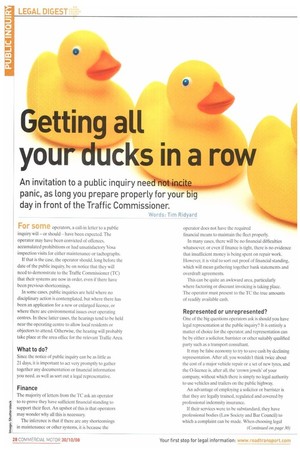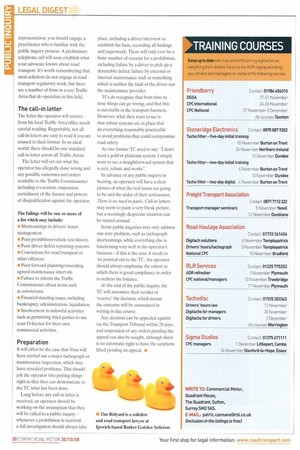Getting all yotirducks in a row
Page 28

Page 30

If you've noticed an error in this article please click here to report it so we can fix it.
An invitation to a public inquiry need not incite panic, as long you prepare properly for your big day in front of the Traffic Commissioner.
Words: Tim Ridyard
For some operators, a call-in letter to a public inquiry will — or should—have been expected. The operator may have been convicted of offences, accumulated prohibitions or had unsatisfactory Vosa inspection visits for either maintenance or tachographs.
If that is the case, the operator should, long before the date of the public inquiry, be on notice that they will need to demonstrate to the Traffic Commissioner (TC) that their systems are now in order, even if there have been previous shortcomings.
In some cases, public inquiries are held where no disciplinary action is contemplated, but where there has been an application for a new or enlarged licence, or where there are environmental issues over operating centres. In these latter cases, the hearings tend to be held near the operating centre to allow local residents or objectors to attend. Otherwise, the hearing will probably take place at the area office for the relevant Traffic Area.
What to do?
Since the notice of public inquiry can he as little as 21 days, it is important to act very promptly to gather together any documentation or financial information you need, as well as sort out a legal representative.
Finance
The majority of letters from the TC ask an operator to re-prove they have sufficient financial standing to support their fleet. An upshot of this is that operators may wonder why all this is necessary.
The inference is that if there are any shortcomings in maintenance or other systems, it is because the operator does not have the required financial means to maintain the fleet properly.
In many cases, there will be no financial difficulties whatsoever, or even if finance is tight, there is no evidence that insufficient money is being spent on repair work. However, it is vital to sort out proof of financial standing, which will mean gathering together bank statements and overdraft agreements.
This can be quite an awkward area, particularly where factoring or discount invoicing is taking place. The operator must present to the TC the true amounts of readily available cash.
Represented or unrepresented?
One of the big questions operators ask is should you have legal representation at the public inquiry? It is entirely a matter of choice for the operator, and representation can be by either a solicitor, barrister or other suitably qualified party such as a transport consultant.
It may be false economy to try to save cash by declining representation. After all, you wouldn't think twice about the cost of a major vehicle repair or a set of new tyres, and the 0-licence is, after all, the 'crown jewels' of your company, without which there is simply no legal authority to use vehicles and trailers on the public highway.
An advantage of employing a solicitor or barrister is that they are legally trained, regulated and covered by professional indemnity insurance.
If their services were to be substandard, they have professional bodies (Law Society and Bar Council) to which a complaint can he made. When choosing legal representation, you should engage a practitioner who is familiar with the public inquiry process. A preliminary telephone call will soon establish what your advocate knows about road transport. It's worth remembering that most solicitors do not engage in road transport regulatory work, but there are a number of firms in every Traffic Area that do specialise in this field.
The call-in letter
'The letter the operator will receive from his local Traffic Area office needs careful reading. Regrettably, not all call-in letters are easy to read if you are unused to their format. In an ideal world, there should be one standard call-in letter across all Traffic Areas.
The letter will set out what the operator has allegedly done wrong and any possible outcomes and orders available to the Traffic Commissioner including revocation, suspension, curtailment of the licence and powers of disqualification against the operator.
The failings will he one or more of a list which may include:
• Shortcomings in drivers' hours management.
• Poor prohibition/vehicle test history • Poor driver defect reporting systems.
• Convictions for road transport or other offences.
• Poor forward planning/exceeding agreed maintenance intervals.
• Failure to inform the Traffic Commissioner about items such as convictions.
• Financial standing issues, including bankruptcy, administration, liquidation.
• Involvement in unlawful activities such as permitting third parties to use your 0-licence for their own commercial activities.
Preparation
It will often be the case that Vosa will have carried out a major tachograph or maintenance inspection, which may have revealed problems. This should jolt the operator into putting things right so that they can demonstrate to the TC what has been done.
Long before any call-in letter is received, an operator should be working on the assumption that they will be called to a public inquiry whenever a prohibition is received.
La full investigation should always take place, including a driver interview to establish the facts, recording all findings and paperwork. There will only ever be a finite number of reasons for a prohibition, including failure by a driver to pick up a detectable defect; failure by external or internal maintenance staff or something which is neither the fault of the driver nor the maintenance provider.
TCs do recognise that from time to time things can go wrong, and that this is inevitable in the transport business. However, what they want to see is that robust systems are in place that do everything reasonably practicable to avoid problems that could compromise road safety.
As one former TC used to say: "I don't need a gold or platinum system. I simply want to see a straightforward system that is safe, robust and works".
In advance of any public inquiry or hearing, an operator will have a clear picture of what the real issues are going to be and the order of their seriousness. There is no need to panic. Call-in letters may seem to paint a very bleak picture, but a seemingly desperate situation can be turned around.
Some public inquiries may only address one core problem, such as tachograph shortcomings, while everything else is functioning very well in the operator's business if this is the case, it needs to be pointed out to the TC. An operator should always emphasise the extent to which there is good compliance in order to redress the balance.
At the end of the public inquiry, the TC will announce their verdict or 'reserve' the decision, which means the outcome will be announced in writing in due course.
Any decision can be appealed against via the Transport Tribunal within 28 days, and suspension of any orders pending the appeal can also be sought, although there is no automatic right to have the sanctions lifted pending an appeal. •




































































































































































